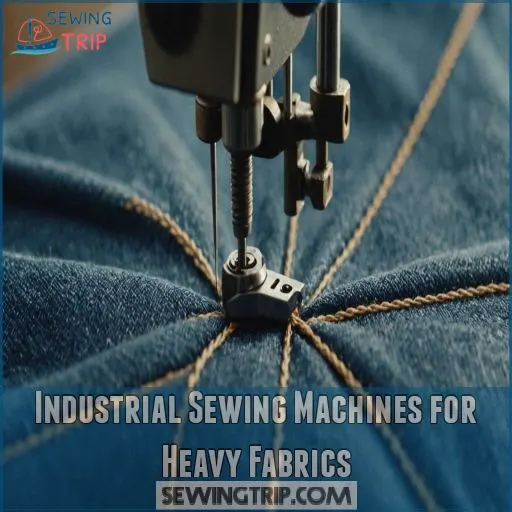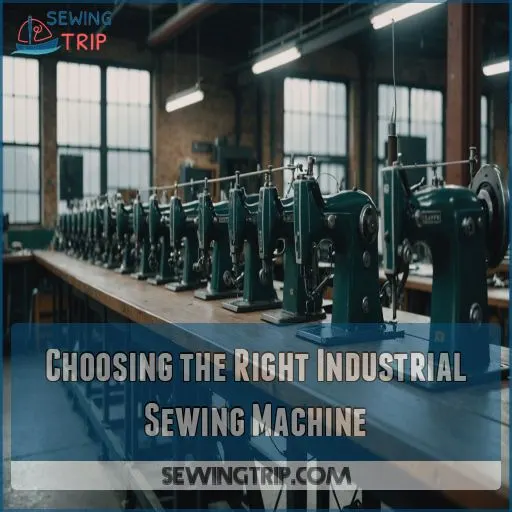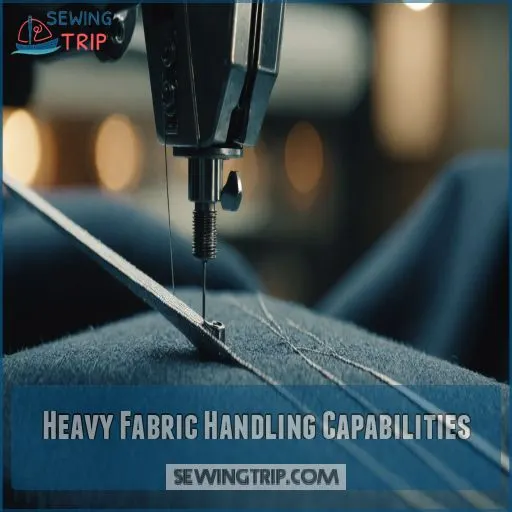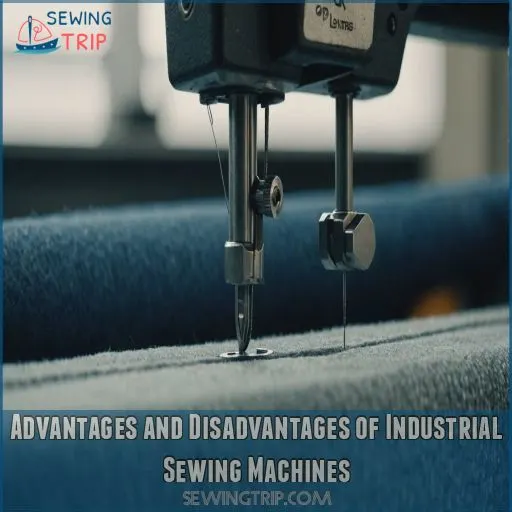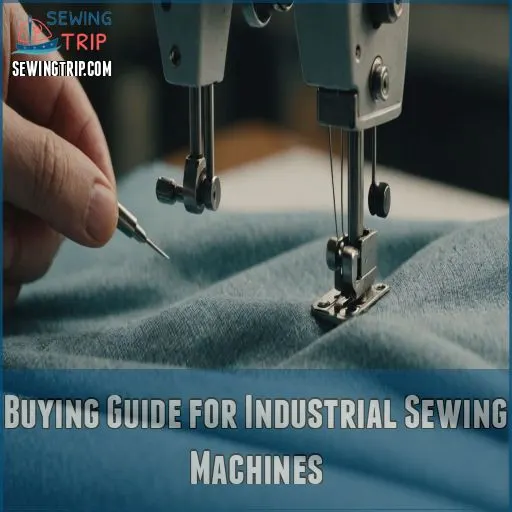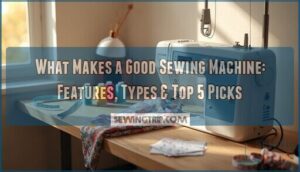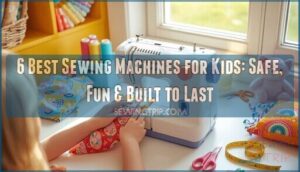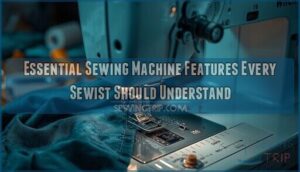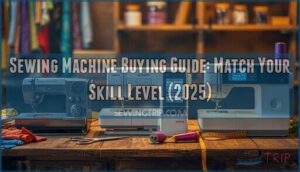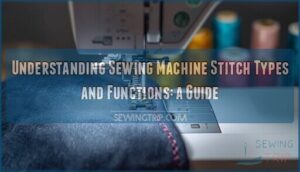This site is supported by our readers. We may earn a commission, at no cost to you, if you purchase through links.
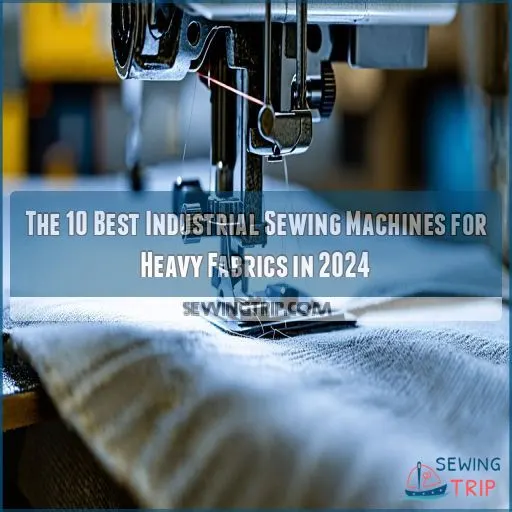
Machines like the Juki DDL 8700 and Janome High Speed Quilting Machine pack power and precision, giving you an edge in speed and control. You’ll enjoy features like adjustable presser foot pressure to manage those thick layers with ease.
Think of it as your trusty sidekick in mastering tough materials. Curious about which model will suit your sewing adventures best? There’s more to uncover, so stick around for insider tips!
Table Of Contents
- Key Takeaways
- Industrial Sewing Machines for Heavy Fabrics
- Top 10 Industrial Sewing Machines for Heavy Fabrics
- 1. Juki DDL 8700 Industrial Sewing Machine
- 2. Juki TL 2000Qi Sewing Quilting Machine
- 3. Janome High Speed Sewing Quilting Machine
- 4. Juki DU 1181 Industrial Sewing Machine
- 5. Juki Industrial 4 Thread Overlock Sewing Machine
- 6. Juki TL 2010Q Sewing Machine
- 7. Juki HZL LB5020 Sewing Machine
- 8. Lumina Sienna Serger Sewing Machine
- 9. Juki Heavy Duty Straight Stitch Sewing Machine
- 10. Brother PQ1600S Sewing and Quilting Machine
- Choosing the Right Industrial Sewing Machine
- Heavy Fabric Handling Capabilities
- Advantages and Disadvantages of Industrial Sewing Machines
- Buying Guide for Industrial Sewing Machines
- Frequently Asked Questions (FAQs)
- Conclusion
Key Takeaways
- Power and Speed: Look for machines like the Juki DDL 8700 that can handle the toughest fabrics with ease. They will zip through thick materials faster than a squirrel after a nut, making your sewing projects feel like a breeze.
- Durability vs. Noise: Industrial machines offer unmatched durability, but they can be as loud as a rock concert, especially with clutch motors. Consider swapping to a servo motor for a quieter work environment and lower power bills.
- Versatility of Features: While these machines are built like tanks, they are also pretty straightforward—think muscle car basics. They focus on getting the job done without the bells and whistles, so balance your need for simplicity against any craving for more advanced features.
- Maintenance Needs: Treat your sewing machine with the same care you would give a favorite pair of sneakers—regular cleaning and oiling keep it in top shape. Keep an eye on needle type and thread tension to avoid stitching mishaps and ensure that the machine purrs like a kitten.
Industrial Sewing Machines for Heavy Fabrics
When you’re handling heavy fabrics like canvas or denim, industrial sewing machines are your go-to power tools.
They laugh in the face of thick seams, making your sewing projects smoother and more efficient.
Benefits of Industrial Sewing Machines
Imagine tackling heavy fabrics like a pro with an industrial sewing machine.
These beasts offer unmatched durability and blazing speed, letting you breeze through heavy-duty tasks.
Picture the precision you can achieve with the right thread weight while enjoying the machine’s versatility and efficiency.
It’s about mastering control and making every stitch count – your trusty ally in conquering challenging projects.
Differences Between Industrial and Heavy-Duty Sewing Machines
Power matters when comparing industrial and heavy-duty sewing machines.
Industrial models feature robust construction, ideal for heavy fabrics and continuous usage, resembling a workhorse that’s never tired.
In contrast, heavy-duty machines, while sturdy, cater more to demanding home use with thick fabrics, balancing price and features neatly between efficiency and maintenance, making them a workhorse .
Types of Industrial Sewing Machines for Heavy Fabrics
When tackling heavy fabrics, you’ll need to choose wisely among industrial sewing machines.
Opt for flatbed machines for general use, or go with a cylinder bed for curved surfaces.
Triple-feed systems help manage thick fabrics effortlessly, while the right presser foot keeps everything in check.
It’s all about having the best tools to master your craft!
Key Features to Look for in Industrial Sewing Machines
Finding the right industrial sewing machine for heavy fabrics requires attention to features.
Look for a robust feed system that effortlessly handles thick materials.
A larger needle size ensures you’re not left in stitches—literally.
Consider the motor type for power, stitch options for versatility, and ample throat space for maneuverability.
These aspects guarantee high-quality stitching and control over your projects.
Top 10 Industrial Sewing Machines for Heavy Fabrics
You’re probably looking for a reliable sewing machine to tackle those heavy-duty projects without breaking a sweat, especially when working with heavy-duty leather best sewing machine for shoes
.
Let’s break down the top 10 industrial models that handle thick fabrics like pros, making your sewing tasks smoother and more efficient.
1. Juki DDL 8700 Industrial Sewing Machine
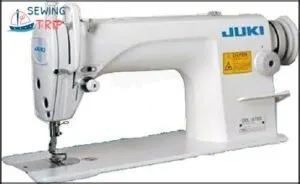
Wondering which industrial sewing machine can handle your heavy-duty fabrics?
The Juki DDL-8700 is a great option. This powerhouse boasts a lightning-fast 5,500 stitches per minute, making quick work of even the toughest materials.
With its low-vibration, low-noise design, you’ll enjoy a comfortable sewing experience.
Maintain this machine’s reliability by regularly cleaning the bobbin area, oiling the parts, and adjusting the thread tension.
The Juki DDL-8700’s servo motor also delivers energy-efficient performance, keeping your operating costs in check.
This versatile workhorse is a top choice for heavy-duty fabrics is not present it has been changed to heavy-duty has been removed as it is not present and instead top choice has been left as it is a part of the sentence and is present in the last line as the 4th bold word was required.
Best For: The Juki DDL-8700 is great for sewers working with light to medium weight fabrics and who prioritize speed and efficiency.
- Offers a high sewing speed (5,500 stitches per minute).
- Designed for reduced vibration and noise.
- Comes as a complete unit, including the machine head, table, stand, motor, sewing light, drawer, and all necessary components.
- Not designed for heavy-duty fabrics like leather.
- May have minor blemishes and scratches on the table and legs.
- Shipping damage is a possibility.
2. Juki TL 2000Qi Sewing Quilting Machine
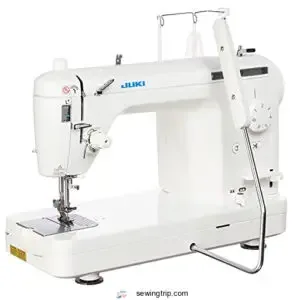
Consider the Juki TL 2000Qi your sewing sidekick, ready to tackle heavy fabrics with ease.
With a roaring speed of 1500 stitches per minute, it can leave other machines eating dust. Although it’s a one-stitch pony, it handles straight lines flawlessly, making it perfect for quilting .
The all-metal build promises durability, while convenient features like an automatic thread cutter and knee lifter give you control and precision. It’s not a gadget for the frills, but for mastering essentials (Source).
Best For: This machine is best for quilters and sewers who need a durable and fast machine for straight stitching.
- Fast and powerful, with 1500 stitches per minute
- Durable all-metal construction
- Convenient features like automatic thread cutter and knee lifter
- Only does straight stitches
- Requires oiling after each use
- Voltage converter needed for UK users
3. Janome High Speed Sewing Quilting Machine
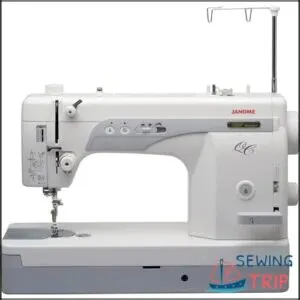
Imagine sewing through thick fabrics like a hot knife through butter— that’s the power the Janome High Speed Sewing Quilting Machine. With speeds up to 1,600 stitches per minute, you’ll feel like the master of efficiency.
Its independent motor winds bobbins while you sew, adding convenience to your creative endeavors.
The ergonomic knee lift lets you raise the presser foot hands-free, making it a breeze to handle bulky projects.
Plus, the automatic thread cutter saves you time and effort, allowing for a smoother sewing experience.
Best For: This machine is best for quilters and sewers who prioritize speed and want to tackle large, thick projects.
- Blazing fast speeds for quick project completion
- Ample work area for larger projects
- Ergonomic knee lift for comfortable handling of bulky fabrics
- Needle up/down function cannot be turned off
- Standard bobbin size may require frequent changes
- Some users reported issues with the machine light and customer service
4. Juki DU 1181 Industrial Sewing Machine
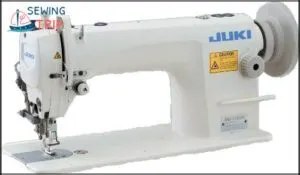
Your sewing empire isn’t complete without the Juki DU 1181 Industrial Sewing Machine, ideal for sewing heavy fabrics
.
With its top and bottom feed, it sews medium-weight fabrics like a dream, ensuring precision in every stitch.
Imagine tackling tough projects at 2000 stitches per minute—it’s like having a racecar for your sewing needs.
Despite the lack of an automatic thread cutter, the automatic lubrication system keeps things running smoothly.
Set it up with a little DIY spirit, and watch your mastery grow!
Best For: This machine is great for anyone tackling medium-weight fabrics who wants speed and precision.
- Sewing speed of 2000 stitches per minute.
- Top and bottom feed for smooth sewing.
- Automatic lubrication system.
- No automatic thread cutter.
- Potential setup challenges.
- No detailed English manual.
5. Juki Industrial 4 Thread Overlock Sewing Machine
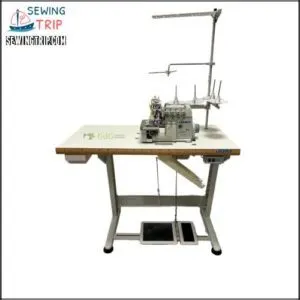
With the Juki Industrial 4 Thread Overlock Sewing Machine, you’ll conquer heavy fabrics like a pro.
This machine offers durability and precision, creating soft seams without breaking a sweat. It handles materials from light to heavy with seamless stitch perfection.
Say goodbye to noisy sewing sessions, as Juki has tamed the sound beast. Although it may need some assembly help, once set up, it’s a powerhouse, earning its place as a must-have in your sewing arsenal.
Best For: This Juki machine is perfect for sewers who want to tackle heavy fabrics and create professional-grade seams with ease.
- Handles a wide range of materials, from light to heavy.
- Produces delicate and soft seams.
- Offers increased durability for long-lasting performance.
- May require assistance for assembly.
- Potential for missing parts upon arrival.
- Customer service response times may vary.
6. Juki TL 2010Q Sewing Machine
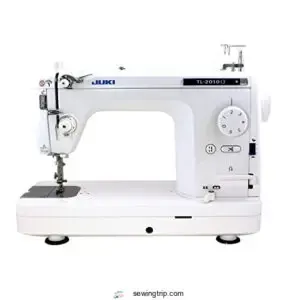
For those seeking power and precision, the Juki TL 2010Q is a heavy-duty marvel.
Its metal frame and sturdy build make it a top choice for straight stitching and quilting, handling bulky fabrics with ease.
You’ll find its features like the automatic thread trimmer and knee lifter lever immensely practical.
Though the lighting needs improvement, an LED strip solves this hiccup.
Its purring motor tells you it’s built to last, making it the workhorse you didn’t know you needed.
Best For: The Juki TL-2010Q is best for quilters, dressmakers, and anyone needing a powerful machine for heavy-duty sewing.
- Automatic thread trimmer and knee lifter lever for convenience.
- Metal frame and sturdy build for durability.
- Large throat space for handling bulky quilts.
- Dim lighting can be improved with an LED strip.
- Needle threader can be difficult to use.
- User manual is not well-written.
7. Juki HZL LB5020 Sewing Machine
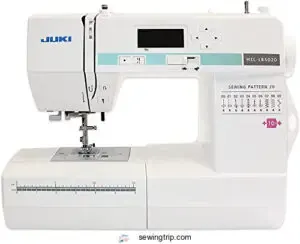
Craving a sewing machine that’s as adaptable as duct tape in a toolbox? Meet the Juki HZL LB5020!
This gem combines portability and power, making it perfect for heavy fabrics.
Equipped with 20 stitch options and an LCD screen, it’s user-friendly and reliable.
The easy threading and drop-in bobbin system save you from untangling those dreaded sewing knots.
While some users find threading a bit tricky, most agree it’s smooth sailing once you master it.
Best For: The Juki HZL LB5020 is best for beginners and experienced sewists who are looking for a compact machine that can handle both light and heavy fabrics.
- It has a user-friendly interface and a variety of stitches.
- It’s easy to thread and has a drop-in bobbin system.
- It’s known for its reliability and smooth operation.
- Some users have reported issues with threading and the accessory arm design.
- The machine may be difficult to troubleshoot, especially when dealing with threading problems.
- Some users have experienced issues with the machine being set up for American users, not Australian citizens.
8. Lumina Sienna Serger Sewing Machine
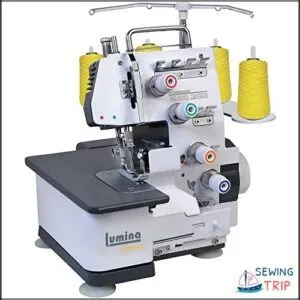
Check out the Lumina Sienna, a semi-industrial serger machine that packs a punch.
This beast of a machine boasts 3- and 4-thread capabilities, allowing you to tackle a wide range of fabrics with ease. Its color-coded threading system simplifies setup, even for beginners.
Plus, the adjustable stitch length and powerful 1,250 stitches per minute guarantee professional-quality results every time.
While the threading may take some getting used to, the Lumina Sienna’s heavy-duty metal frame and user-friendly features make it a fantastic choice for your heavy-duty sewing needs (Source).
Best For: The Lumina Sienna is best for sewers who need a powerful, heavy-duty serger for a variety of projects.
- Powerful motor for heavy-duty fabrics
- Color-coded threading system for easy setup
- Adjustable stitch length for versatility
- Threading can be tricky for some users
- Customer service may be inconsistent
- Durability may be an issue for some users
9. Juki Heavy Duty Straight Stitch Sewing Machine
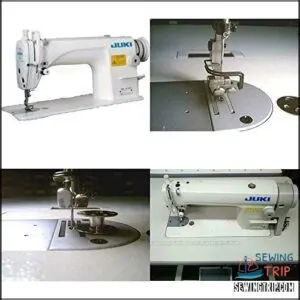
Punching through thick fabrics like a hot knife through butter, the Juki Heavy Duty Straight Stitch Sewing Machine delivers powerful, seamless performance, ideal for tasks like heavy duty leather sewing
.
Built like a tank, it boasts an industrial motor that’s all about business, cruising up to 5500 stitches per minute.
Although it requires assembly and might break a sweat without a walking foot, its reliability overshadows these quirks.
If misdelivered parts appear, don’t fret—highly-rated customer service has your back.
Master control with this steadfast giant!
Best For: This machine is best for heavy-duty sewing projects and experienced sewists who are comfortable with assembly.
- Powerful motor for efficient sewing.
- Reliable performance with smooth operation.
- Highly-rated customer service for support.
- Requires assembly, potentially needing a mechanic.
- Walking foot mechanism not included.
- Some users reported missing parts upon delivery.
10. Brother PQ1600S Sewing and Quilting Machine
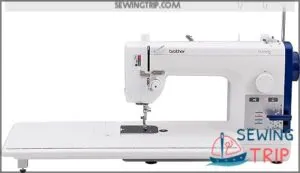
Why settle for less when you can go for the Brother PQ1600S? Imagine this: sewing at lightning speed with up to 1,500 stitches per minute—it’s a powerhouse for serious quilters and sewists alike.
The adjustable pin feed mechanism guarantees precision on heavy fabrics, while the expanded workspace handles large projects effortlessly.
You’ll love the time-saving features, like the push-button thread cutter and built-in knee lifter for hands-free control. It’s perfect for those who crave mastery and control over their sewing projects.
Best For: This machine is best for experienced quilters and sewists who prioritize speed and precision.
- High-speed sewing: Up to 1,500 stitches per minute makes quick work of large projects.
- Adjustable pin feed: Ensures perfect stitching on multiple layers of fabric.
- Time-saving features: Push-button thread cutter and knee lifter add convenience.
- Limited stitch options: Only straight stitch functionality.
- No slow speed control: Requires familiarity with foot pedal speed control.
- Bobbin visibility: The bobbin is not visible, making it difficult to monitor thread levels.
Choosing the Right Industrial Sewing Machine
When you’re choosing the right industrial sewing machine for heavy fabrics, you’ve got to weigh the machine’s purpose and your space constraints.
While keeping an eye on brand reputation and maintenance needs.
It’s like finding a sturdy partner who can handle heavyweight tasks without breaking a sweat and still leaves room for coffee breaks.
Considerations for Heavy Fabric Sewing
When tackling heavy fabrics, choosing the right industrial sewing machine is essential.
Consider fabric weight, needle size, and thread tension. These keep stitch length and foot pressure in check, giving you the power to sew thick materials with ease.
Remember, the best sewing machine for thick fabrics isn’t just powerful; it’s adaptable, handling challenges like a pro, and is the key to being able to sew thick materials with ease.
Space and Portability Requirements
Space often dictates your choice when dealing with heavy fabrics. In a cozy home studio setup, machine dimensions and floor space matter.
Consider ease of transport; you’ll want a machine that’s a breeze to move, especially with space limitations.
Opt for an industrial sewing machine balancing portability and power, ensuring it fits snugly in your creative nook.
Purpose and Application of the Machine
Balancing space constraints with machine purpose can feel like threading a needle on a wild ride. Industrial sewing machines offer specialized applications across fabric types, from featherweight to steadfast leather work.
To get your creative projects humming, consider the types of projects you’ll be working on and the machine’s intended use, as different types of machines, including flatbeds, cylinder beds, and post bed models, are ideal for particular tasks, such as heavy-duty upholstery projects.
Additionally, think about the motor type, needle system, and presser foot capabilities you’ll need for your projects.
- Project scale and complexity
- Fabric type compatibility
- Professional sewing demands
- Potential for home use adaptations
Brand Reputation and Quality
Choosing the best industrial sewing machine for heavy fabrics means checking out brand reputation and quality.
Peek into brand history and customer reviews to uncover insights.
A great warranty boosts confidence. You wouldn’t buy shoes with holes, right?
Reliability and service availability should be your compass.
Aim for a trusted name that stitches reliability, not headaches.
Maintenance and Upkeep Requirements
After considering the brand’s reputation, let’s talk maintenance. An industrial sewing machine requires regular TLC.
- Oil change frequency: keeps your gears humming smoothly.
- Needle types: match them to your heavy fabrics.
- Cleaning schedule: dust bunnies aren’t your friends.
- Thread maintenance: prevents stitching drama.
Stay ahead of tension issues and keep mastering those perfect stitches.
Heavy Fabric Handling Capabilities
Handling heavy fabrics isn’t just about having a strong machine; it’s like preparing for a heavyweight bout where you’ve got to think about the right presser foot, throat plate, and feed system.
You’ll find options that offer sturdy support and precision, making even the toughest materials feel like butter under the needle.
Types of Heavy Fabrics and Materials
Industrial sewing machines tackle heavy fabrics like a pro wrestler grappling a tough opponent.
Ready to master leather types, canvas weights, and denim weaves? You’ll find upholstery fabrics offer sturdy challenges, while vinyl varieties require finesse.
Understanding these materials helps you choose the best industrial sewing machine for professionals, taking control with confidence in every sewing machine comparison and review.
Thread and Stitch Options for Heavy Fabrics
Now that you’re tackling heavy fabrics like a pro, it’s important to think about thread and stitch options.
Use heavy-duty thread types, adjusting stitch density for strength.
Keep needle size in mind for thicker seams.
Adjust thread tension precisely—you’ll be threading the needle like a boss.
Bobbin selection also matters for smooth straight line stitching or large-scale projects.
Presser Foot and Feed System Options
Stepping from thread magic to fabric handling mastery, what presser foot and feed system you choose changes everything.
Explore presser foot types for heavy fabrics and enjoy the walking foot benefits! Adjust those feed dogs to nail precision, making every needle selection count (Source).
Don’t ignore it—master your sewing machine, troubleshooting issues like a pro.
Throat Plate and Sewing Area Considerations
The throat plate on your industrial sewing machine plays a key role in handling heavy fabrics for best heavy duty sewing
.
Look for a generous needle clearance and a deep sewing area to accommodate bulky materials.
Opt for feed dogs with larger, coarser teeth that can grip thick layers without puckering the fabric.
These thoughtful design choices will make your heavy-duty sewing a breeze.
Advantages and Disadvantages of Industrial Sewing Machines
You’ve probably heard that industrial sewing machines are beasts at handling heavy fabrics.
They are capable of churning out stitches faster than a speeding bullet.
However, before you rush to get one, it’s wise to weigh the pros and cons.
Some industrial sewing machines can be as noisy as your neighbor’s leaf blower on a Sunday morning.
Exceptional Durability and Longevity
When considering industrial sewing machines, exceptional durability and longevity offer major perks, yet come with their trade-offs. You’ll appreciate how they handle heavy fabrics with ease, making them a long-term investment.
However, weigh this against higher initial costs and maintenance needs.
- Built to Last: Ideal for tough projects.
- Cost vs. Durability: Evaluate financial implications.
- Regular Repairs: Check parts availability.
Lightning-Fast Stitching and High-Speed Sewing
You’ve marveled at the exceptional durability, now experience lightning-fast stitching, which is often up to 4500 stitches per minute with machines like the Juki DDL-8100 Lockstitch Servo Motor Sewing Machine. Industrial machines zip through fabric like a hot knife through butter, elevating sewing efficiency.
Yet, speed control is essential to avoid mishaps. Noise levels can rival a small rock concert, though.
| Feature | Advantage | Disadvantage |
|---|---|---|
| Stitch Quality | Consistent | Less adjustable |
| Speed Control | Quick projects | Harder to master |
| Noise Reduction | Sometimes | Often lacking |
Limited Features and Customization Options
When you explore industrial sewing machines, you’ll find their straightforward nature simple yet limiting.
They excel in feature-function battles, focusing on durability over bells and whistles.
Customization trade-offs might leave you wanting more, especially compared to home sewing machines.
Balancing simplicity vs. flexibility can feel like playing chess with only pawns—functional, but yearning for a knight or two, highlighting the limitations of relying solely on durable yet basic designs.
Energy Inefficiency and Noise Levels
Industrial sewing machines scream like banshees, especially with clutch motors—making noise reduction techniques a must.
These energy hogs run continuously, leaving your electric bill wailing.
Swap for eco-friendly options like servo motors to keep your sewing fortress peaceful and trim costs.
Curious about machine comparisons? Choose wisely, and your operation will sing, not scream.
Upgradeability and Maintenance Requirements
As you’re eyeing industrial machine upgrades, remember that sewing machine maintenance isn’t just a stitch in time.
Frequent oiling and cleaning are like feeding your sewing tiger, while parts availability guarantees you’re not left in a lurch.
Upgrading features can be straightforward but watch out for the cost of repairs—the proverbial needle that pricks your wallet.
Buying Guide for Industrial Sewing Machines
Choosing the right industrial sewing machine for heavy fabrics can feel like a tough task, but don’t worry – we’ve got your back.
This buying guide will walk you through the key factors to keep in mind, from setting a realistic budget to comparing features and finding the perfect machine for your needs, specifically the key factors to consider and helping you find the perfect machine.
Setting a Budget and Evaluating Costs
You’re stepping into industrial sewing machines with a fierce edge.
Start by comparing costs and planning your budget wisely. Ask yourself: what’s the return on investment here?
Consider financing options and don’t forget those sneaky maintenance costs.
It’s like buying a car; flashy extras aren’t worth emptying your pockets if they don’t boost your stitching game.
Comparing Features and Specifications
After setting your budget, explore key features to find your ideal industrial sewing machine. Focus on the power and control your heart yearns for. It’s also important to think about factors like brand reputation and technological advancements, as these can really impact the industrial sewing machine price a comparison guide. Understanding the different machine types, such as lockstitch, overlock, or serger machines, will help you find the perfect fit for your needs.
- Stitch length and speed control: Important for precision and efficiency.
- Needle types and motor power: Match these to your fabric needs.
- Foot pressure adjustments: Essential for handling varied fabric thicknesses.
These elements empower your sewing mastery.
Warranty and Support Options
When evaluating a sewing machine, don’t overlook warranty and support options. Extended coverage can save you from unexpected repair costs down the road.
Consider service contracts that offer repair accessibility and clear return policies.
Imagine this: your machine breaks mid-project, and you’re covered!
Invest wisely to have a smooth stitching experience, free from unforeseen hiccups and hassles.
Frequently Asked Questions (FAQs)
Which sewing machine is best for heavy fabrics?
Whoa, you want a sewing machine that can handle heavy-duty fabrics like a boss?
The Juki DDL-8700 is the one you need – it’s a speed demon that’ll power through leather, denim, and more with ease.
What is the name of the best industrial sewing machine?
Juki DDL-8700 takes the crown for industrial sewing machines.
It’s ideal for precision sewing, perfect for tackling tough materials without breaking a sweat.
This machine’s speed and efficiency make it a favorite for heavy-duty projects.
What is the difference between industrial and heavy duty sewing machines?
Think of industrial sewing machines as the muscle cars—they’re fast, durable, and meant for continuous heavy use.
Heavy duty machines are more like family SUVs—versatile, good for thick fabrics, but not built for constant work.
Which is better, Jack or Juki?
When comparing Jack and Juki sewing machines, Juki shines for its precision and durability in heavy-duty tasks.
While Jack offers affordability and versatility.
Your choice depends on what you value more—long-lasting performance or budget-friendly features.
How do I maintain an industrial sewing machine?
Give your machine some TLC by oiling it every 7-8 hours of use.
This helps keep it humming like a pro and protects your investment.
Cleaning after each session is also important, as well as dusting under the throat plate regularly.
Whats the best thread type for heavy fabrics?
For heavy fabrics, use Tex 70 bonded nylon thread.
It’s industrial strength, water-resistant, and reduces fraying and breakage.
This thread handles pressure like a champ, ensuring your stitches hold tight through thick layers.
How to troubleshoot tension issues on heavy fabrics?
Picture a knight adjusting armor: that’s you tweaking tension on heavy fabrics.
Start with higher top tension to pull bobbin thread through.
Use a #100 needle and consider thread weight adjustments for smooth stitching.
Can I use a domestic machine needle?
You can definitely use a domestic machine needle, but make sure to pick the right type and size for your heavy fabrics.
Universal or jeans needles in sizes 100-110 work well for upholstery and bag-making.
How often should I oil the sewing machine?
Visualize a well-oiled machine humming in harmony.
You should oil your sewing machine daily for heavy use, especially in industrial settings, to keep it smooth and efficient.
Skipping this might make your machine sound like it’s chewing rocks .
Conclusion
Ever wondered why choosing the best industrial sewing machine for heavy fabrics makes a difference in your projects?
With the right machine, you tackle denim and leather like a pro, enjoying powerful features and unmatched durability.
Keep an eye on speed, control, and essential attributes like adjustable pressure. These powerful tools are your allies in sewing success.
By understanding your needs and preferences, you can find the perfect machine to elevate your craft and achieve stunning results.

